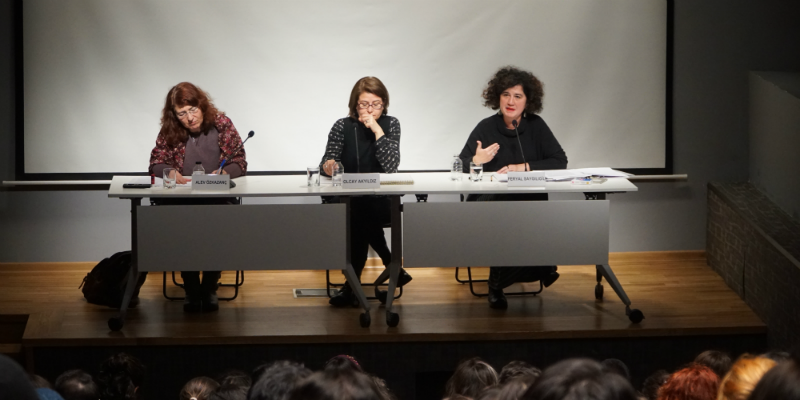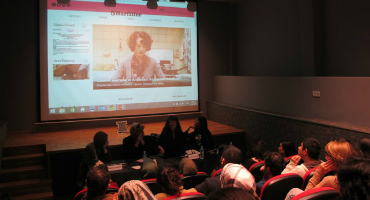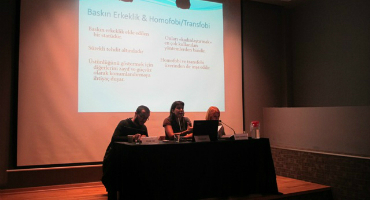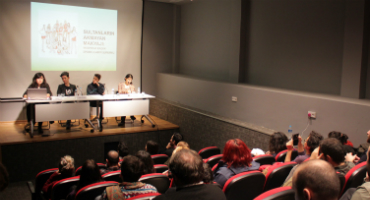Organized by ASULIS Discourse, Dialog and Democracy Laboratory of Hrant Dink Foundation, the talk titled 'Conceptual Discussions: Discourse in Feminist and Queer Thought', which is the third session of the conceptual discussion series, was held on January 22, 2018 in Anarad Hığutyun Building Havak Hall. It was moderated by Olcay Akyıldız and speakers Feryal Saygılıgil and Alev Özkazanç discussed the relation of feminist and queer thought with discourse.
Making the opening speech, Olcay Akyıldız stated that they will discuss the formation of feminist and queer discourse, and how feminist and queer criticism intervene in the established modes of understanding and thought by regarding feminist and queer thought’s theoretical approach to discourse. Then Akyıldız gave floor to Feryal Saygılıgil to talk about the processes in which women realized the patriarchal discourse, opposed it and created their own discourse in the context of its historical transformation, and also to discuss restrictive aspects of the dominant discourse on one hand and to talk about the possibilities of counter discourse on the other hand.
Feryal Saygılıgil opened her speech with Sarah Ahmed’s term “killjoy feminism”, which provides women with a survival and resistance kit. Saygılıgil stated that Sarah Ahmed thinks that what is personal is both political and theoretical and according to Ahmed, feminism is a duty. Saygılıgil also stated that according to Ahmed women cannot express what they went through since they lack the words for describing what they experience and are subjected to and they will be able to realize what they have experienced once they create their own words. On this point, she emphasized the importance of creating a language peculiar to women within the resistance mechanisms. Stating that feminism is a practice of understanding, interpreting and transforming the world for Ahmed, Saygılıgil used Judith Butler’s notion of political responsibility to understand this practice. According to Butler, people find themselves in the world of others which affects them and then start to transform that world. In short, according to Saygılıgil, when we have feminist thought in our baggage, we are equipped with political responsibility and also we find ourselves in a situation where we are open to learning, eager to understand others and with the help of that understanding we try to understand and transform ourselves.
Speaking after Saygılıgil, Alev Özkazanç started with Butler’s theoretical discussion on performativity. She stated that Butler’s approach to discourse analysis and hate speech is informed by her notion of performative and with this approach, she radically criticized the dominant position of American progressive politics in ‘90s. Özkazanç stated that Butler’s anomalous stance and criticism against the paradigm that was dominant in American left in ‘90s and has been influencing the world and Turkey since then is the same what Butler regards as queer feminism. According to Butler, American progressive politics in ‘90s recognized expressions of hate as criminal act and suggested prohibiting them, but it was based on a faulty understanding of performativity, because illocutions’ effects are not due to an expression that is uttered in a limited context; on the contrary, those effects are powerful because they are related to a certain institutional and historical power that was constituted long before and has been repeated constantly. Furthermore, if an expression has a power in a certain period, this power is not only coming from the past but also from the future, because that institutionalized power is nurtured by past and future alike. Özkazanç also stated that Butler thinks that language might hurt people since it is highly constructive for human subjectivity, but pointing to hurting is not enough for Butler. According to Butler, language constructes a subjectivity only in a limited manner; when a certain groups is given a name, there might be ulterior motives, but once you are called by a name, whether a proper name or a group name, you become a subject and it initiates agency. The language doesn’t construct you unchangeably and necessarily as the oppressed, victim and passive forever and all the time; on the contrary, it construct you as a subject that will go out of control and create certain effects of agency. Özkazanç stated that for Butler human subjectivity can be created by subject’s own behaviors and actions, and by disrupting repetitions and what is uncontrollable. Özkazanç also pointed out that in this way repetition can also enable disrupting and creative repetitions by creating uncontrollable effects and these repetitions differentiate by being carried to new contexts and reinterpreted. In short, a negative naming referring to a certain group may create eye-opening new perspectives by being subjected to a novel repetition and gaining historical mobility.





